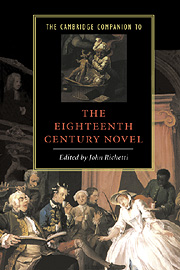Book contents
- Frontmatter
- 1 Introduction
- 2 The novel and social/cultural history
- 3 Defoe as an innovator of fictional form
- 4 Gulliver's Travels and the contracts of fiction
- 5 Samuel Richardson
- 6 Henry Fielding
- 7 Sterne and irregular oratory
- 8 Smollett's Humphry Clinker
- 9 Marginality in Frances Burney's novels
- 10 Women writers and the eighteenth-century novel
- 11 Sentimental novels
- 12 Enlightenment, popular culture, and Gothic fiction
- Index
1 - Introduction
Published online by Cambridge University Press: 28 May 2006
- Frontmatter
- 1 Introduction
- 2 The novel and social/cultural history
- 3 Defoe as an innovator of fictional form
- 4 Gulliver's Travels and the contracts of fiction
- 5 Samuel Richardson
- 6 Henry Fielding
- 7 Sterne and irregular oratory
- 8 Smollett's Humphry Clinker
- 9 Marginality in Frances Burney's novels
- 10 Women writers and the eighteenth-century novel
- 11 Sentimental novels
- 12 Enlightenment, popular culture, and Gothic fiction
- Index
Summary
The title of this volume is misleading in a usefully revealing sense. As a classification for the many prose narratives produced in Britain over the course of the eighteenth century, “novel” is a convenient label rather than a historically accurate term, which tells us much more about our own late twentieth-century assumptions concerning narrative than about the eighteenth-century sense of what prose fiction was for its contemporary readers and writers. What we now think of as the novel - a long prose narrative about largely fictional if usually realistic characters and plausible events - did not actually solidify in the minds of readers and writers as a literary type or a set of expectations for narrative in the English-speaking world until the beginning of the nineteenth century, when Jane Austen and Walter Scott flourished, and when the novel in our current sense of it was widely accepted in Britain and elsewhere in Europe as a major literary form, as the inevitable and inescapable mode of telling a long fictional story. Eighteenth-century “novels” such as we now read and study represent part of the “prehistory” of novelistic development; they constitute the early and truly formative phase of the novel as a genre of prose fiction that has since then come to dominate readers' sense of what literary narrative should be.
- Type
- Chapter
- Information
- Publisher: Cambridge University PressPrint publication year: 1996
- 8
- Cited by

